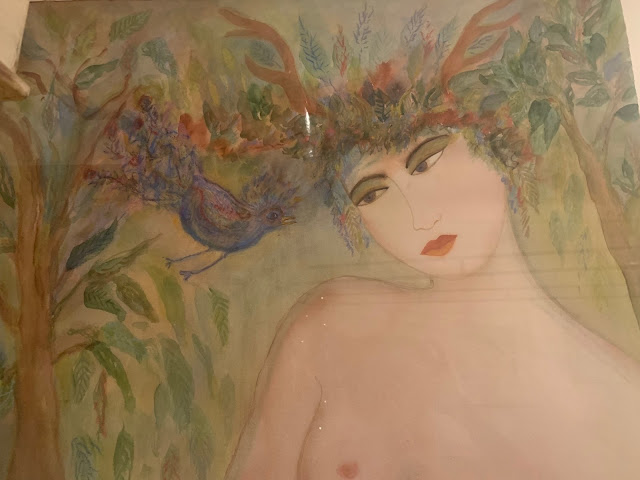"Daphne" by Alexandra Dikeakos (from the collection of meche kroop)
Richard Strauss composed an epilogue to his opera Daphne in 1943, over 6 years after he composed the opera. Last night at Carnegie Hall, the choral work was performed before the opera. Under the effective direction of James Bagwell, The Bard Festival Chorus delivered the a cappella work entitled An den Baum Daphne in the best possible fashion; lush melodies were woven together into a dense texture with luminous harmonies that delighted the ear as Joseph Gregor's text paid tribute to the transfigured Daphne, now a tree.
We wish we had enjoyed the opera as much. It was a poor decision to present the opera in Carnegie Hall with the singers onstage in front of the orchestra. With some exceptions which we will get to, the singers struggled to be heard above the massive forces of Strauss' orchestra. Most of them failed to be heard. Maestro Leon Botstein, a formidable scholar and lecturer, did not manage to achieve balance between orchestra and singers.
The most important exception was soprano Jana McIntyre in the title role; her highly focused instrument sailed right over the orchestra and managed to impress us with its clarion tone and meaningful colors. We have been a fan of Ms. McIntyre since we first heard her as a student at Manhattan School of Music in 2015, dazzling us with her Queen of the Night in Mozart's Die Zauberflöte. We heard her twice as a George London finalist, showing off her long lines in Bellini's I Puritani and then as Amina in his La Sonnambula. We heard her as an apprentice of the Santa Fe Opera as Lucia. The first time we heard her sing Strauss was as Zdenka in Arabella. Most recently we heard her as Ännchen in Heartbeat Opera's Der Freischutz.
Our greatest joy is in watching young opera singers grow and achieve their promise. Tenor Aaron Blake has a similarly lengthy history with us. The George London Foundation honored him a few years after his competition win with a recital of his own. We heard him sing Edgardo's final lament with New Amsterdam Opera. We heard him at Metropolitan Opera concerts as Lensky, Don Ottavio, and Nemorino. We were there when he introduced us to Gregory
Spears' Fellow Traveler, and Donizetti's Parisini d'Este. But what we remember best was the most impactful delivery of Schubert's "Erlkönig" that we ever heard. Last night he was mostly audible as the shepherd Leukippos and we were sorry when Apollo killed him off.
Mezzo-soprano Ronnita Miller sang the role of Gaea, Daphne's mother, and impressed us with her low notes. We thought of her as a contralto and imagined her singing Erda in Wagner's Ring Cycle.
Beyond that, we didn't hear much vocally, certainly not enough to assess the gifts of the other singers. The usually fine heldentenor Kyle van Schoonhoven pushed to be heard over the orchestra and sounded "woofy". The shepherds could not be heard at all. The two maidens, performed by Marlen Nahhas and Ashley Dixon harmonized beautifully when they could be heard. Mostly we just felt sorry for the singers to have been put in such a position.
What we did enjoy was Strauss' colorful and dense orchestration. There was actually an alphorn played by the Assistant Chair of the Horn Division. As a matter of fact, the winds were so compelling that we wound up looking for information on the difference between a bass clarinet and a basset horn, two members of the clarinet family with deep mellow sounds.
The orchestra got most of our attention when Ms. McIntrye wasn't floating her gorgeous tones over the dense sounds. Strauss' writing leans toward the programmatic and, although we couldn't hear the words and did not want to read along with the libretto, we found that the orchestration did a fine job of telling the story of a pure nature-loving young woman who rejects the call of romantic love and gets transformed into a tree by a guilty Apollo who has slain her friend and would-be lover Leukippos. Indeed, we heard a brass chorale as the father Peneios (Stefan Egerstrom) spoke of the gods on Olympus. The color of the orchestra exceeded those of the rainbow creating images of nature and moods of reverence.
We suppose we should be grateful for the opportunity to hear a rarely performed work, even in concert version. However, we might just as well have stayed at home and listened to a CD.
© meche kroop

No comments:
Post a Comment